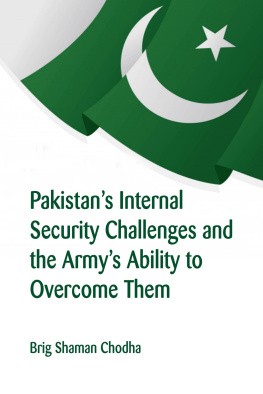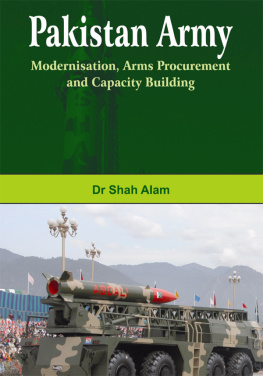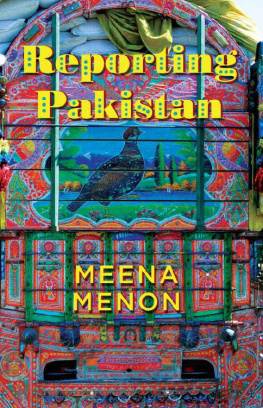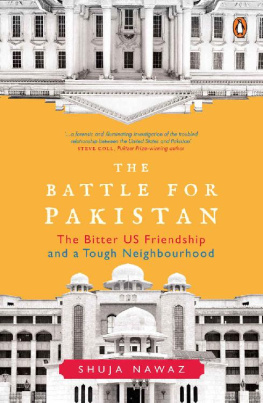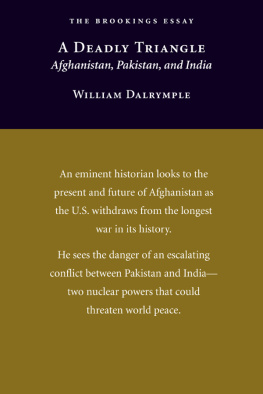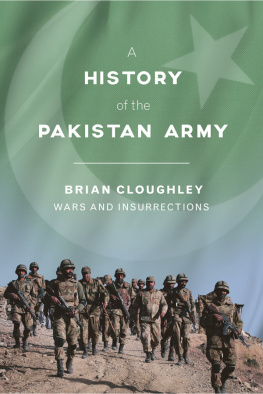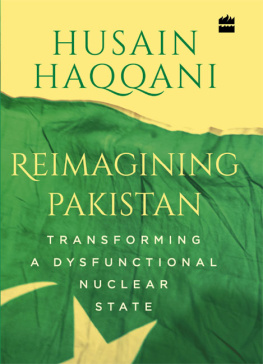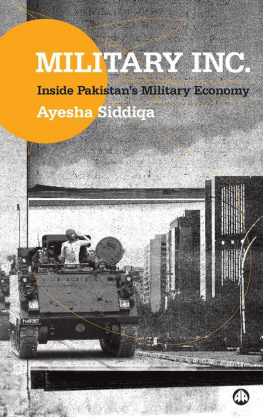Pakistan. Army. - Fighting to the end: the Pakistan Armys way of war
Here you can read online Pakistan. Army. - Fighting to the end: the Pakistan Armys way of war full text of the book (entire story) in english for free. Download pdf and epub, get meaning, cover and reviews about this ebook. City: USA;Pakistan, year: 2018;2014, publisher: Oxford University Press, genre: Politics. Description of the work, (preface) as well as reviews are available. Best literature library LitArk.com created for fans of good reading and offers a wide selection of genres:
Romance novel
Science fiction
Adventure
Detective
Science
History
Home and family
Prose
Art
Politics
Computer
Non-fiction
Religion
Business
Children
Humor
Choose a favorite category and find really read worthwhile books. Enjoy immersion in the world of imagination, feel the emotions of the characters or learn something new for yourself, make an fascinating discovery.

- Book:Fighting to the end: the Pakistan Armys way of war
- Author:
- Publisher:Oxford University Press
- Genre:
- Year:2018;2014
- City:USA;Pakistan
- Rating:5 / 5
- Favourites:Add to favourites
- Your mark:
- 100
- 1
- 2
- 3
- 4
- 5
Fighting to the end: the Pakistan Armys way of war: summary, description and annotation
We offer to read an annotation, description, summary or preface (depends on what the author of the book "Fighting to the end: the Pakistan Armys way of war" wrote himself). If you haven't found the necessary information about the book — write in the comments, we will try to find it.
Fighting to the end: the Pakistan Armys way of war — read online for free the complete book (whole text) full work
Below is the text of the book, divided by pages. System saving the place of the last page read, allows you to conveniently read the book "Fighting to the end: the Pakistan Armys way of war" online for free, without having to search again every time where you left off. Put a bookmark, and you can go to the page where you finished reading at any time.
Font size:
Interval:
Bookmark:
Fighting to the End
The Pakistan Armys Way of War
C. CHRISTINE FAIR


Oxford University Press is a department of the University of
Oxford. It furthers the Universitys objective of excellence in research, scholarship, and education by publishing worldwide.
Oxford New York
Auckland Cape Town Dar es Salaam Hong Kong Karachi
Kuala Lumpur Madrid Melbourne Mexico City Nairobi
New Delhi Shanghai Taipei Toronto
With offices in
Argentina Austria Brazil Chile Czech Republic France Greece
Guatemala Hungary Italy Japan Poland Portugal Singapore
South Korea Switzerland Thailand Turkey Ukraine Vietnam
Oxford is a registered trademark of Oxford University Press
in the UK and certain other countries.
Published in the United States of America by
Oxford University Press
198 Madison Avenue, New York, NY 10016
Oxford University Press 2014
All rights reserved. No part of this publication may be reproduced, stored in a retrieval system, or transmitted, in any form or by any means, without the prior permission in writing of Oxford University Press, or as expressly permitted by law, by license, or under terms agreed with the appropriate reproduction rights organization. Inquiries concerning reproduction outside the scope of the above should be sent to the Rights Department, Oxford University Press, at the address above.
You must not circulate this work in any other form and you must impose this same condition on any acquirer.
Library of Congress Cataloging-in-Publication Data
Fair, C. Christine, author.
Fighting to the end : the Pakistan Armys way of war / C. Christine Fair.
pages; cm
Includes bibliographical references.
ISBN 9780199892709 (hardback : alkaline paper) 1. Pakistan. Army
2. PakistanMilitary policy. 3. National securityPakistan.
4. PakistanForeign relations. 5. Islam and statePakistan. I. Title.
UA853.P18F35 2014
355.03355491dc23
2013036644
9 8 7 6 5 4 3 2 1
Printed in the United States of America
on acid-free paper
For Jeff
This project has been many years in the making. There are numerous persons and institutions to thank. I have had the privilege and honor of being mentored by the finest minds in the study of South Asias security. Many of these persons I have now known for nearly two decades, and most are among my dearest friends, colleagues, and collaborators. These ustads have offered generous insights into this effort and have been a constant source of guidance in this and almost every other project I have undertaken. I owe the deepest gratitude to (in alphabetical order) Ahsan Butt, Christopher Clary, Stephen P. Cohen, Sumit Ganguly, John (aka Jack) Gill, Tim Hoyt, K. Alan Kronstadt, Peter Lavoy, Doug Makeig, Polly Nayak, David O. Smith, Ashley Tellis, Marvin Weinbaum, and Rob Williams.
I owe a particular recognition to a series of US Army South Asia Foreign Area Officers with whom I have met over the years. These include Brian Hedrick, Richard Girven, Gregory Ryckman, Scott Taylor, Scott Zurschmit, and Rick White as well as Gill and Smith.
In addition, Ayesha Jalal, Paula Newberg, and Shuja Nawaz provided thoughtful feedback early in this project. Thomas Johnson and Thomas Barfield critically read the fifth chapter of this volume with particular care. In addition, Id like to thank the two anonymous reviewers who provided helpful critiques on the first draft.
Many Georgetown colleagues read parts of this manuscript and gave me insightful guidance and advice from the proposal to the drafting stages. Many thanks go to Daniel Byman, David Edelstein, Bruce Hoffman, and Kathleen McNamara in particular.
I am also indebted to the many Pakistanis in and out of uniform with whom I have had the benefit of interacting over many years, including Mahmud Ali Durrani, Husain Haqqani, Farahnaz Ispahani, Jahangir Karamat, Maleeha Lodhi, Sherry Rehman, Commodore Zaffar Iqbal, and Ehsan ul Haq as well as numerous defense attachs like Brigadier Butt and many more men in uniform than can be possibly named here for space and prudence. In past years, personnel from Pakistans Interservices Public Relations facilitated travel and meeting requests and answered questions. Khalid H., ostensibly from the Ministry of Information, was especially helpful as he accompanied me during travels to South and North Waziristan, Swat, Khyber Pakhtunkhwa, interior Sindh, and other locales. He also personally delivered several Pakistan Army Green Books in a paper bag to me while I recuperated from a concussion at an Islamabad nail saloon.
I am also beholden to Georgetown Universitys Graduate School as well as the Edmund A. Walsh School of Foreign Service, which provided various kinds of support that enabled this project, ranging from small research grants to a junior faculty research leave in fall 2012. In addition, the American Institute of Pakistan Studies enabled me to do research in Islamabad at the end of 2012, and the American Institute of Afghan Studies permitted fieldwork in Helmand and Kabul in August 2010.
Much of the data collection was done at the fine South Asia collections at the University of Chicago and the University of California, Berkeley as well as the New York Public Library. Without those resources, this project would not be possible. I am also appreciative of the brief access that I have had to the National Defence University Library in Islamabad as well as the library at the Institute for Strategic Studies Islamabad.
I have also profited from the contributions of several fabulous research assistants. Much of the quantitative work that I have done with the Pakistan Army data would not be possible without Anirban Gosh. Michael Hardin provided survey and other data analytical support. Son Lee and Cheng He presented valuable assistance with mapping programs. Finally, Sarah Watson Jordan has been my right-hand woman for two years now. It has been an honor to work with her, and I wish her the best as she leaves Georgetown and moves forward to what will be a highly productive career.
Jacob N. Shapiro and Neil Malhotra have been my collaborators for several years. We fielded two large surveys of Pakistanis in 2009 and 2012. I incorporate some of these findings in this volume. It has truly been a pleasure to work with them as they are genuinely ingenious yet profoundly wonderful human beings.
I thank my husband (Jeff) and family (Joe, Whitney, Mallory, Logan, Pork, Ashley, Pickles and Cam, Bob and Bug), who endured holidays and weekends without me. My dear friends Hannah Bloch, Lisa Curtis, Simbal Khan, and Praveen Swami have provided endless support as well as advice. My students have been fun sources of enthusiastic encouragement. Of course, my canine associatesMs. Oppenheimer, Vega Pussoise, and Emmahelped ensure that I did not become obese during this process by insisting upon lengthy walks and bouts of vigorous belly rubs and derriere scratches. Ms. Oppenheimer has been my constant companion since 1999. Although I know I must, I cannot imagine undertaking a project without her support and pit bull spirit of surmounting.
Finally, I thank David McBride at Oxford University Press for supporting this project. Without him, all of this would be pointless.
Despite the collective help and wisdom of all of these generous folks, I alone am responsible for errors of fact or interpretation or a failure to be creative and thoughtful.
Next pageFont size:
Interval:
Bookmark:
Similar books «Fighting to the end: the Pakistan Armys way of war»
Look at similar books to Fighting to the end: the Pakistan Armys way of war. We have selected literature similar in name and meaning in the hope of providing readers with more options to find new, interesting, not yet read works.
Discussion, reviews of the book Fighting to the end: the Pakistan Armys way of war and just readers' own opinions. Leave your comments, write what you think about the work, its meaning or the main characters. Specify what exactly you liked and what you didn't like, and why you think so.

